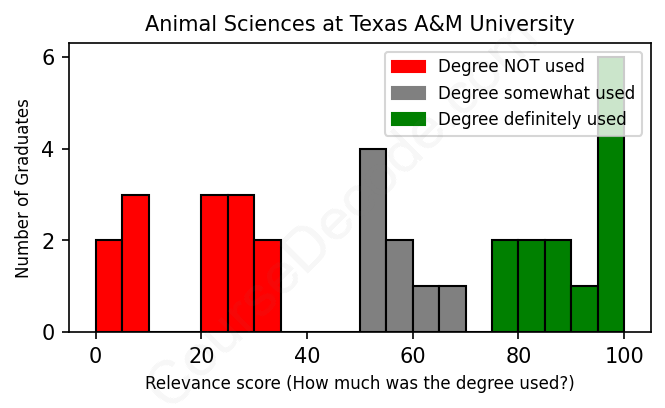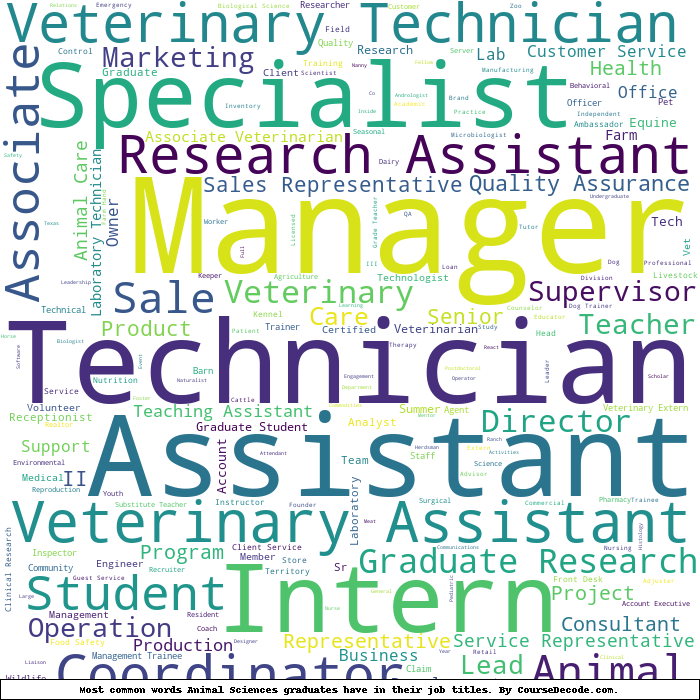
First, some facts. Of the Animal Sciences graduates from Texas A&M University we've analyzed , here's how many have used (or NOT used) their degree in their career:

These are estimates based on AI analysis of 34 LinkedIn profiles (see below).
The verdict? Significantly below average. Overall, with an average relevance score of 54%, Animal Sciences graduates from Texas A&M University have a much lower likelihood (-13%) of finding work in this field compared to the average graduate across all fields:
And for comparison, here's the chart for all profiles we've looked at across all degrees.
Also, after graduating, 50% of these graduates have pursued further education other than another Bachelor's degree (such as a Masters degree or other), compared to the average across all profiles of 35%. This suggests you may need more than just a Bachelors degree to be competitive as a Animal Sciences graduate.
See the details:
|
Relevance score: 78% We think this person has gone into a career highly relevant to their degree. We think this person has gone into a career highly relevant to their degree.
DEGREE INFOGraduated in 2014 from Texas A&M University with a Bachelor of Science (B.S.) in Animal Sciences. Also pursued further education since (see below). JOB HISTORY SINCE GRADUATIONHealth and Fitness Facilitator Brazos Valley Center for Independent Living Jan 2014 - Apr 2015 Personal Care Attendant  Human Services Mar 2015 - Aug 2015 Rehab Technician  Texas Hand Therapy Aug 2015 - Jan 2016 Promotional Ambassador  Texas Watermelon Association Jan 2015 - Feb 2016 Server  Longhorn Tavern Steakhouse Aug 2015 - May 2016 Nanny  family Jan 2016 - May 2016 Therapeutic Riding Instructor  Refuge Services, Inc.(Equine-assisted therapy) Dec 2016 - May 2018 Occupational Therapy Level II Fieldwork Student  Northern Colorado Long Term Acute Hospital Jun 2018 - Aug 2018 Occupational Therapy Level II Fieldwork Student  Epic Pediatric Therapy Aug 2018 - Nov 2018 Pediatric Occupational Therapist  Angels of Care Pediatric Home Health Jan 2019 - Sep 2019 Pediatric Occupational Therapist  Care Options for Kids Mar 2019 - Present Supervising Occupational Therapist  Care Options for Kids Nov 2019 - Present FURTHER DEGREES DONE SINCE GRADUATINGMaster's degreeTexas Tech University Health Sciences Center 2016 - 2018 ABOUTNo information provided. |
The top 10 most common jobs done by the graduates we've analyzed (ranked most common to least) are:
So, looking at the job paths of people who graduated with a degree in Animal Sciences from Texas A&M University, you notice a mix of roles that range from directly related to animal care to ones that venture far from the field. A lot of graduates end up in sales and management roles, especially in companies that deal with telecommunications or various services like Verizon and Cargill. While these positions can utilize soft skills like communication and problem-solving—which are certainly valuable—the connection to Animal Sciences feels pretty weak. In fact, many of these jobs, particularly in sales or management, don’t really call for the specialized knowledge you'd expect from an Animal Sciences degree. It's almost like they just happened to have that degree on their resumes, instead of leveraging it in their day-to-day jobs.
On the flip side, there are also quite a few graduates who are working in roles that are highly relevant to animal sciences, like becoming veterinarians, veterinary technicians, and positions focused on animal welfare and research. Jobs in veterinary medicine and animal care show a direct application of their education and often involve hands-on work with animals, which is super fulfilling for those who are passionate about the field. Yet, when you step back and look at the broader picture, it feels like a significant number of graduates are not utilizing their degree in a meaningful way. Whether it's by landing roles in sales, customer service, or even unrelated sectors, a lot of these individuals might find themselves feeling a little disconnected from the passion they likely had for animals when they first chose this path. So overall, while some are thriving in the animal sciences realm, many others are venturing quite far from it.
Here is a visual representation of the most common words in job titles for Animal Sciences graduates (this is across all Animal Sciences graduates we've analyzed, not just those who went to Texas A&M University):

So, when you look at the career paths of graduates from the Animal Sciences program at Texas A&M University, it's clear that there are a mix of outcomes. Right after graduation, a lot of people seem to start in various entry-level positions, often not directly related to animal sciences. For instance, several alumni moved into sales roles or administrative positions, such as sales representatives and project coordinators. This might suggest that while they have a solid foundation in animal sciences, many choose to explore different avenues initially, especially in sales, management, or education, rather than diving straight into the animal industry.
Fast forward five to ten years later, and you can see some engaging more deeply with their degree. Some become veterinarians or take on roles in veterinary practices, research, or animal health. Others have transitioned into management positions within companies associated with animal products or agricultural services. There is definitely a segment of the graduates who have found successful careers that leverage their education in animal sciences, but there’s also a notable portion that ventured into unrelated fields or sales. Overall, while many graduates seem to find a niche that connects back to their studies, there’s a fair number that end up in roles that aren't closely tied to animal sciences, illustrating that the career trajectory can widely vary based on personal choices and opportunities that arise post-graduation.
Getting a Bachelor’s degree in Animal Sciences at Texas A&M can be pretty challenging, but it’s definitely manageable if you stay on top of your studies. You’ll dive into subjects like animal genetics, nutrition, and health, which can get technical and require a good grasp of biology and chemistry. The coursework is jam-packed, and there can be a fair amount of lab work, so time management is crucial. A&M has a strong program, so you’ll be surrounded by motivated peers, which can either motivate you or feel competitive at times. Overall, it’s more demanding than some other degrees, but if you’re passionate about animals and put in the effort, you’ll likely find it rewarding!
Most commonly, in the LinkedIn profiles we've looked at, it takes people 4 years to finish a Bachelor degree in Animal Sciences.
Looking at these Texas A&M Animal Sciences graduates, it seems like they’ve generally been able to land decent jobs that should pay pretty well, especially as you go further down the list. A lot of them have climbed the ladder in their fields, taking on roles like General Manager at Verizon or Director of Steel Fabrication, which typically come with nice salaries. Some, like the recent vet graduates, may not start out with super high pay, but becoming an Associate Veterinarian or a Family Nurse Practitioner eventually leads to good earnings. Many of those in the veterinary and agricultural sectors have put in their time and seem to be in roles that not only align with their studies but also offer solid income potential—definitely better than starting out at minimum wage! Overall, it looks like they’re doing pretty well, especially compared to the early entry-level positions they had right out of college.
Here is a visual representation of the most common words seen in the "about" section of LinkedIn profiles who have a Bachelor degree in Animal Sciences (this is across all Animal Sciences graduates we've analyzed, not just those who went to Texas A&M University). This may or may not be useful:

Here are all colleges offering a Bachelor degree in Animal Sciences (ordered by the average relevance score of their Animal Sciences graduates, best to worst) where we have analyzed at least 10 of their graduates:
| College | Score | Count |
|---|---|---|
 Purdue University Purdue University
|
80 | 14 |
 California State Polytechnic University-Pomona California State Polytechnic University-Pomona
|
78 | 13 |
 North Carolina State University North Carolina State University
|
77 | 18 |
 Iowa State University Iowa State University
|
75 | 25 |
 University of Missouri-Columbia University of Missouri-Columbia
|
75 | 12 |
 South Dakota State University South Dakota State University
|
73 | 10 |
 The Ohio State University The Ohio State University
|
71 | 21 |
 University of Florida University of Florida
|
68 | 15 |
 University of Vermont University of Vermont
|
68 | 12 |
 Michigan State University Michigan State University
|
67 | 20 |
 University of California, Davis University of California, Davis
|
66 | 27 |
 University of Illinois at Urbana-Champaign University of Illinois at Urbana-Champaign
|
63 | 16 |
 University of Tennessee, Knoxville University of Tennessee, Knoxville
|
61 | 13 |
 University of Arkansas University of Arkansas
|
60 | 10 |
 California Polytechnic State University-San Luis Obispo California Polytechnic State University-San Luis Obispo
|
59 | 22 |
 University of Wisconsin-River Falls University of Wisconsin-River Falls
|
58 | 10 |
 Texas A&M University Texas A&M University
|
54 | 34 |
 Penn State University Penn State University
|
53 | 14 |
 Texas Tech University Texas Tech University
|
51 | 12 |
 Kansas State University Kansas State University
|
51 | 22 |
 Oklahoma State University Oklahoma State University
|
43 | 16 |